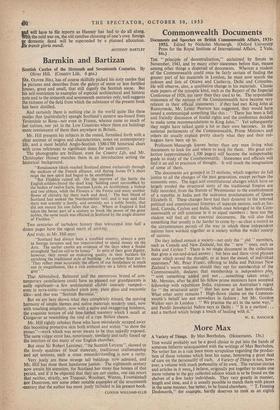Commonwealth Documents
THE " principle of decentralisation," acclaimed by Smuts in November, 1943, and by many other statesmen before that, means among other things a dispersal of documents. Whereas a student of the Commonwealth could once be fairly certain of finding the greater part of his materials in London, he must now search the indexes and lists of Ottawa and Canberra, Delhi and Colombo. He will observe, also, a qualitative change in his materials.' Classic state papers of the synoptic kind, such as the Report of the Imperial Conference of 1926, are rarer than they used to be. The responsible statesmen of the nations of the Commonwealth have become very reticent in their official statements : if they had met King John at Runnymede, Mr. Lester Pearson has suggested, they would have issued a communique something like this : " There has been 'a full and friendly discussion of feudal rights and the conference decided to make some recommendations to King John." Yet subsequently they might have talked quite a lot in their own baronies. In the national parliaments of the Commonwealth, Prime Ministers and others do usually explain pretty clearly what they and their col- leagues have been up to.
Professors Mansergh knows better than any man living what documents to look for and where to look for them. His great col- lection (approximately 1,300 pages) will become the indispensable guide to study of the Commonwealth. Statesmen and officials will find it an aid to precision of thought. It will touch the imagination of some of them.
The documents are grouped in 23 sections, which together do full justice to all the changes of the past generation, except perhaps the economic ones. The legal and constitutional changes which have so largely eroded the structural unity of the traditional Empire are fully recorded, from the Statute of Westminster to the establishment of a republic in India and the accession proclamations of Queen Elizabeth IL These changes have had their dynamic in the internal political and constitutional histories of separate nations, such as Ire- land, Canada, Ceylon and India, which once belonged to the Com- monwealth or still continue in it as equal members : here too the student will find all the essential documents. He will also find something that usually is far harder to come by—as clear a record as the circumstances permit of the way in which these independent nations have worked together as a society within the wider society of nations.
Do they indeed remain a society—not only the " old " members, such as Canada and New Zealand,, but the " new " ones, such as India and Ceylon ? There is no single document in the collection that gives a cut-and-dried answer ; but here and there vivid phrases occur which reveal the thought, or at least the mood, of individual statesmen.' Mr. Peter Fraser, offering to India and Pakistan New Zealand's warm welcome should they opt for membership of the Commonwealth, declares that membership is independence plus, " with something added and not ... something taken away." Mr. Menzies, after he, and his fellow prime ministers have accepted fellowship with republican India, expresses an Australian's regret for " the structural unity " that has now at last been destroyed. What other unity remains ? High-flown claims on the Common- wealth's behalf are not nowadays in fashion ; but Mr. Gordon Walker says in London : " We practise the art in the same way," and Pandit Jawaharlal Nehru says in Delhi : " It is a method ... and a method which brings a touch of healing with it."
W. K. HANCOCK


































 Previous page
Previous page